28th November 2019 Juba, South Sudan
Floods in Pibor
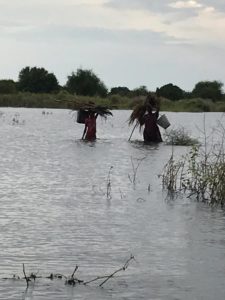 Imagine you are living in a country that is facing a major humanitarian crisis and a civil war. And then it starts raining. Not for a day or two but solidly, for months. The town you are living in, with a population of around 40,000 people, is one of the poorest and most remote in the country, and is situated on a flood plain. Gradually the water rises and you realise that unless you act quickly nothing is going to survive.
Imagine you are living in a country that is facing a major humanitarian crisis and a civil war. And then it starts raining. Not for a day or two but solidly, for months. The town you are living in, with a population of around 40,000 people, is one of the poorest and most remote in the country, and is situated on a flood plain. Gradually the water rises and you realise that unless you act quickly nothing is going to survive.
So you abandon your home, build a series of mini dykes round the three highest spots in the town and then frantically try to prevent them from being breached as the water level slowly peaks. And then it sits there, for weeks on end. And you are crammed into the space of a school yard with 7,000 others trying to survive. But every journey involves waist deep water and a trudge through mud of the consistency of treacle. Everyone in the town is affected. All the schools and clinics have been put out of action. And until the water levels go down there is nothing you can do except wait.
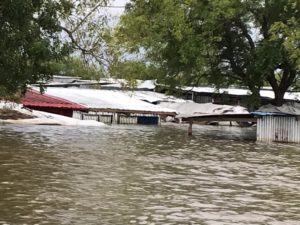 Imagine you are working for an NGO in this town. As you frantically try to give the population the capacity to cope with the rising water your own compound is slowly being submerged. You lose your supplies, your accommodation and your office. You too retreat to the only patch of dry ground on which to pitch your tent – a slab of concrete in the sea of mud that is the local UN base. And from there you try to keep going, wading through thigh high water every day to the people who are counting on you for everything.
Imagine you are working for an NGO in this town. As you frantically try to give the population the capacity to cope with the rising water your own compound is slowly being submerged. You lose your supplies, your accommodation and your office. You too retreat to the only patch of dry ground on which to pitch your tent – a slab of concrete in the sea of mud that is the local UN base. And from there you try to keep going, wading through thigh high water every day to the people who are counting on you for everything.
I have tweeted videos of landings in other parts of South Sudan. Nothing compares to this view of what is normally busy Pibor town! pic.twitter.com/Xcun6ZkjYG
— Chris Trott (@ChrisTrott) November 7, 2019
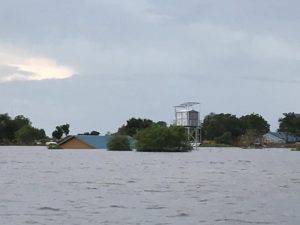 I am not a naïve first-timer unaccustomed to witnessing the terrible suffering fellow human beings face across this planet. I have worked in conflict, I have seen the impact of famine and drought. But nothing prepared me for what I saw in Pibor in the eastern part of South Sudan earlier this month. The ‘airstrip’ had just reopened having spent weeks masquerading as a river, and there was a patch of dry ground big enough for two helicopters to land side by side (although their pilots could not stop the rotors turning until they had made sure the wheels weren’t sinking in the mud). But to walk to the governor’s office we had to wade through water that was at times three feet deep and still flowing.
I am not a naïve first-timer unaccustomed to witnessing the terrible suffering fellow human beings face across this planet. I have worked in conflict, I have seen the impact of famine and drought. But nothing prepared me for what I saw in Pibor in the eastern part of South Sudan earlier this month. The ‘airstrip’ had just reopened having spent weeks masquerading as a river, and there was a patch of dry ground big enough for two helicopters to land side by side (although their pilots could not stop the rotors turning until they had made sure the wheels weren’t sinking in the mud). But to walk to the governor’s office we had to wade through water that was at times three feet deep and still flowing.
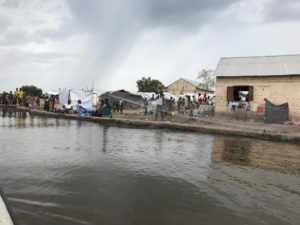 The entire population of the town, and many who had sought refuge from neighbouring villages were crammed into three tiny patches of ground, protected by dykes. They have been there for weeks, and will be there for many more. All semblance of normal life has ended. And they are totally dependent on the very fragile supply chain that has just started to deliver essential goods to them. Thanks in part to the UK’s support to the logistics cluster in funding an extra helicopter.
The entire population of the town, and many who had sought refuge from neighbouring villages were crammed into three tiny patches of ground, protected by dykes. They have been there for weeks, and will be there for many more. All semblance of normal life has ended. And they are totally dependent on the very fragile supply chain that has just started to deliver essential goods to them. Thanks in part to the UK’s support to the logistics cluster in funding an extra helicopter.
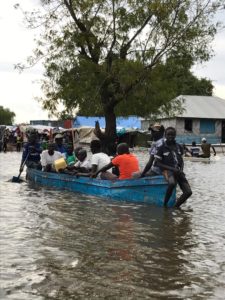 Then we met the small band of humanitarian workers, from a total of 26 different International and local NGOs. People who had also lost most of what they had in the field, who were trying to keep going in the most extreme circumstances. Delivering supplies whenever they could afford to pay (personally) for the rent of one of the three functioning boats in town.
Then we met the small band of humanitarian workers, from a total of 26 different International and local NGOs. People who had also lost most of what they had in the field, who were trying to keep going in the most extreme circumstances. Delivering supplies whenever they could afford to pay (personally) for the rent of one of the three functioning boats in town.
Unsure when and where their next delivery of supplies would come from. Themselves living in the most basic conditions. One of the most dedicated band of people I have ever had the honour to meet – they had been offered the option of evacuation but had chosen to stay. As had the Governor, whose decision to remain with his people was the one spark of hope that people clung on to as they assessed their prospects for the coming weeks.
These are the challenges we are facing in South Sudan. People kept thanking me for getting my feet wet, but I felt humbled by their stoicism and honoured by the warmth of the welcome they were keen to extend to us. I couldn’t have felt more proud of the work we are doing to try to respond to this crisis, and I proud also that the UK, through the Department for International Development, will make a real difference in the most extraordinary circumstances.
Thanks you for showing those photos of flood in South Sudan to the world to know
Thank you ambassador for your help to people of greater Bebior.
Thank you for your heart for the people of South Sudan. They are a very resilient people who only need a period of peace and a boost here and there to become a truly healthy, impactful nation
We shall that moment soon with leaders like you who get it and do something!
Thank you